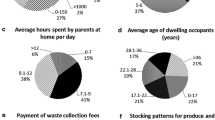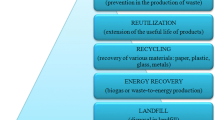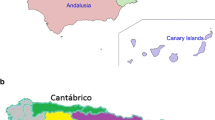Abstract
Increasing pressure of the European Union on diverting municipal waste from landfills requires an active role of households and commands a radical change of their behavior. Knowledge of behavioral patterns enables an effective design of municipal waste management systems. Based on several factors influencing environmental behavior, this paper aims at analyzing differences in municipal waste generation among Czech municipalities using socio-demographic factors. A set of 12 characteristics for 5445 Czech municipalities was investigated. Using ordinary least squares regression, we developed a model with eight indicators describing household size, gender, completed education level and diverse housing characteristics. Even though the model explains only 5.1% of waste generation variability among Czech municipalities, it is statistically significant. Other factors such as age or population density do not improve the model significantly. The resulting model will be used as a basis for further spatial analysis.
Similar content being viewed by others
References
Dyson B, Chang NB (2005) Forecasting municipal solid waste generation in fast-growing urban region with system dynamic modeling. Waste Manag. https://doi.org/10.1016/j.wasman.2004.10.005
Brown DP (2015) Garbage: how population, landmass, and development interact with culture in the production of waste. Resour Conserv Recy. https://doi.org/10.1016/j.resconrec.2015.02.012
Bandara NJGJ., Hettiaratchi JPA, Wirasinghe SC, Pilapiiya S (2007) Relation of waste generation and composition to socio-economic factors: a case study. Environ Monit Assess. https://doi.org/10.1007/s10661-007-9705-3
Cecere G, Mancinelli S, Mazzanti M (2014) Waste prevention and social preferences: the role of intrinsic and extrinsic motivations. Ecol Econ. https://doi.org/10.1016/j.ecolecon.2014.07.007
Tonglet M, Phillips PS, Bates MP (2004) Determining the drivers for householder pro-environmental behavior: waste minimization compared to recycling. Resour Conserv Recy. https://doi.org/10.1016/j.resconrec.2004.02.001
Barr S (2007) Factors influencing environmental attitudes and behaviors: a U.K. case study of household waste management. Environ Behav. https://doi.org/10.1177/0013916505283421
Hage O, Söderholm P, Berglund C (2009) Norms and economic motivation in household recycling: empirical evidence from Sweden. Resour Conserv Recy. https://doi.org/10.1016/j.resconrec.2008.11.003
van den Bergh JCJM. (2008) Environmental regulation of households: an empirical review of economic and psychological factors. Ecol Econ doi. https://doi.org/10.1016/j.ecolecon.2008.04.007
Lange F, Brückner C, Kröger B, Beller J, Eggert F (2014) Wasting ways: perceived distance to the recycling facilities predicts pro-environmental behavior. Resour Conserv Recy. https://doi.org/10.1016/j.resconrec.2014.07.008
Hornik J, Cherian J, Madansky M, Narayana C (1995) Determinants of recycling behavior: a synthesis of research results. J Soc Econ. https://doi.org/10.1016/1053-5357(95)90032-2
Latif SA, Omar MS, Bidin YH, Awang Z (2012) Environmental values as a predictor of recycling behavior in urban areas: a comparative study. In: ASEAN conference on environment-behaviour studies. Bangkok, Thailand, 16–18 July 2012
Mazzanti M, Zoboli R (2009) Municipal waste Kuznets curves: evidence on socio-economic drivers and policy effectiveness from the EU. Environ Resour Econ. https://doi.org/10.1007/s10640-009-9280-x
Gellynck X, Jacobsen R, Verhelst P (2011) Identifying the key factors in increasing recycling and reducing residual household waste: a case study of the Flemish region of Belgium. J Environ Manage. https://doi.org/10.1016/j.jenvman.2011.06.006
Lebersorger S, Beigl P (2011) Municipal solid waste generation in municipalities: Quantifying impacts of household structure, commercial waste and domestic fuel. Waste Manag. https://doi.org/10.1016/j.wasman.2011.05.016
Slavik J, Pavel J (2013) Do the variable charges really increase the effectiveness and economy of waste management? A case study of the Czech Republic. Resour Conserv Recy. https://doi.org/10.1016/j.resconrec.2012.09.013
Starr J, Nicolson C (2015) Patterns in trash: factors driving municipal recycling in Massachusetts. Resour Conserv Recy. https://doi.org/10.1016/j.resconrec.2015.03.009
EUWID (2016) Debatte um Steuer oder Pfand auf Einwegbecher nimmt an Fahrt auf. EUWID Recycl Entsorg 26(6)
Hoffmeister J, Gellenbeck K (2009) Einfluss demografischer und wirtschaftlicher Faktoren auf die Abfallmengenentwicklung in Berlin—Abschlussdokumentation für die Berliner Stadtreinigungsbetriebe. Prognos AG/INFA GmbH. 17.7.2009
Talalaj IA, Walery M (2015) The effect of gender and age structure on municipal waste generation in Poland. Waste Manag. https://doi.org/10.1016/j.wasman.2015.03.020
Burcin B, Kučera T (2010) Forecast of the Czech Republic population development for the period 2008–2070 (in Czech). http://www.mpsv.cz/files/clanky/8842/Prognoza_2010.pdf. Accessed 20 June 2016
Abbott A, Nandeibam S, O’Shea L (2011) Explaining the variation in household recycling rates across the UK. Ecol Econ doi. https://doi.org/10.1016/j.ecolecon.2011.06.028
D’Elia JLI (2008) Determinants of household waste recycling in Northern Ireland. Economic Research Institute of Northern Ireland. 2008. http://eservices.afbini.gov.uk/erini/pdf/ERINIMon23.pdf. Accessed 27 June 2016
Jenkins RR, Martinez SA, Palmer K, Podolsky MJ (2003) The determinants of household recycling: a material-specific analysis of recycling program features and unit pricing. J Environ Econ Manag. https://doi.org/10.1016/S0095-0696(02)00054-2
Hage O, Söderholm P (2008) An econometric analysis of regional differences in household waste collection: the case of plastic packaging waste in Sweden. Waste Manag. https://doi.org/10.1016/j.wasman.2007.08.022
Sterner T, Bartelings H (1999) Household waste management in a Swedish municipality: determinants of waste disposal, recycling and composting. Environ Resour Econ. https://doi.org/10.1023/A:1008214417099
Mazzanti M, Montini A, Zoboli R (2008) Municipal waste generation and socioeconomic drivers: evidence from comparing northern and southern Italy. J Environ Dev. https://doi.org/10.1177/1070496507312575
Benítez SO et al (2008) Mathematical modeling to predict residential solid waste generation. Waste Manag. https://doi.org/10.1016/j.wasman.2008.03.020
Dennison GJ, Dodd VA, Whelan B (1996) A socio-economic based survey of household waste characteristics in the city of Dublin, Ireland. I. Waste composition. Resour Conserv Recy. https://doi.org/10.1016/0921-3449(96)01070-1
Kipperberg G (2007) A comparison of household recycling behaviors in Norway and the United States. Environ Resour Econ. https://doi.org/10.1007/s10640-006-9019-x
Johnstone N, Labonne J (2004) Generation of household solid waste in OECD countries: an empirical analysis using macroeconomic data. Land Econ. https://doi.org/10.2307/3655808
Schultz PW, Oskamp S, Mainieri T (1995) Who recycles and when? A review of personal and situational factors. J Environ Psychol. https://doi.org/10.1016/0272-4944(95)90019-5
Keser S, Duzgun S, Aksoy A (2012) Application of spatial and non-spatial data analysis in determination of the factors that impact municipal solid waste generation rates in Turkey. Waste Manag. https://doi.org/10.1016/j.wasman.2011.10.017
SPSS (2017) SPSS Statistics. IBM Knowledge Centre. https://www.ibm.com/support/knowledgecenter/SSLVMB_20.0.0/com.ibm.spss.statistics.help/linear_regression_methods.htm. Accessed 20 June 2017
Daskalopoulos E, Badr O, Probert SD (1998) Municipal solid waste: a prediction methodology for the generation rate and composition in the European Union countries and the United states of America. Resour Conserv Recy. https://doi.org/10.1016/S0921-3449(98)00032-9
Rybová K, Slavík J (2016) Smart cities and ageing population—implications for waste management in the Czech Republic. In: Smart cities symposium Prague. 26 May 2016
Dubská D (2015) Příjmová nerovnost Prahy a regionů. Statistika&My
Bortoleto AP, Kurisu KH, Hanaki K (2012) Model development for household waste prevention behavior. Waste Manag. https://doi.org/10.1016/j.wasman.2012.05.037
López-Mosquera N, Lera-López F, Sánchez M (2015) Key factors to explain recycling, car use and environmentally responsible purchase behaviors: a comparative perspective. Resour Conserv Recy. https://doi.org/10.1016/j.resconrec.2015.03.007
Borgstede C von, Andersson K (2010) Environmental information—explanatory factors for information behavior. Sustainability. https://doi.org/10.3390/su2092785
Meneses GD, Palacio AB (2005) Recycling behavior. Environ Behav. https://doi.org/10.1177/0013916505276742
Thomas C, Sharp V (2013) Understanding the normalisation of recycling behaviour and its implications for other pro-environmental behaviours: a review of social norms and recycling. Resour Conserv Recy. https://doi.org/10.1016/j.resconrec.2013.04.010
Bartoňová D, Kučera M (2005) Prognóza cenzových domácností v České republice na období do roku 2030. Demografie 47:229–244
Dornbusch HJ (2011) Perspektiven für die Logistik und Stadtreinigung. 12. Münsteraner Abfallwirtschaftstage, Münster (February 2011)
Simonetto EO, Borenstein D (2007) A decision support system for the operational planning of solid waste collection. Waste Manag. https://doi.org/10.1016/j.wasman.2006.06.012
Acknowledgements
This paper is supported by the Czech Science Foundation under project no. 16-14409 “Demographic development and behavioral aspects (e.g., ‘crowding-out’ effect) and their impact on the municipal waste charging policy”.
Author information
Authors and Affiliations
Corresponding author
Rights and permissions
About this article
Cite this article
Rybová, K., Slavík, J., Burcin, B. et al. Socio-demographic determinants of municipal waste generation: case study of the Czech Republic. J Mater Cycles Waste Manag 20, 1884–1891 (2018). https://doi.org/10.1007/s10163-018-0734-5
Received:
Accepted:
Published:
Issue Date:
DOI: https://doi.org/10.1007/s10163-018-0734-5




